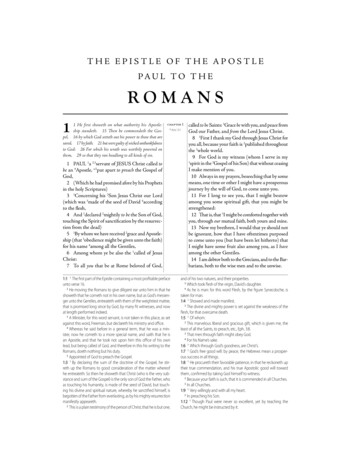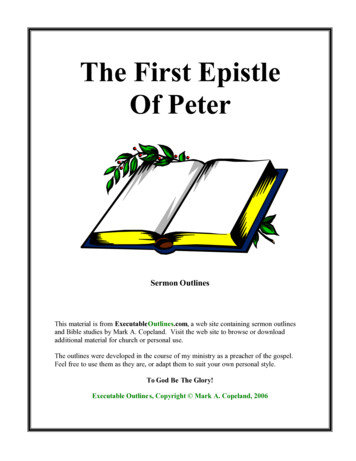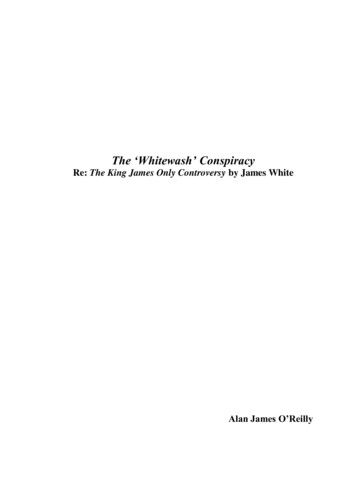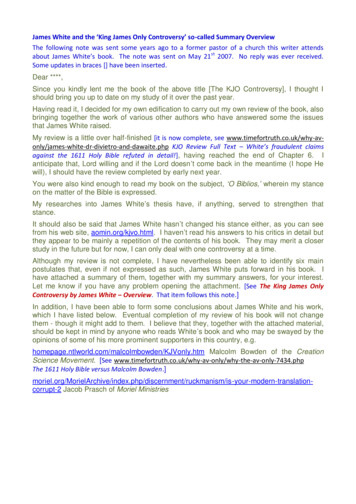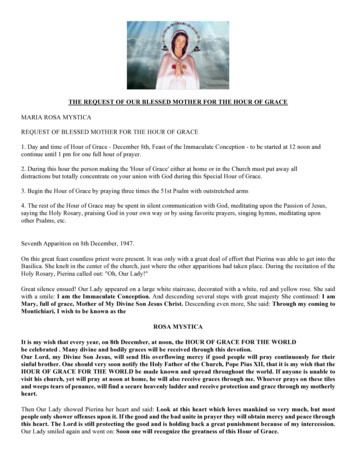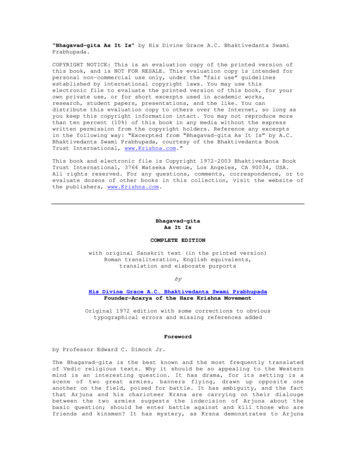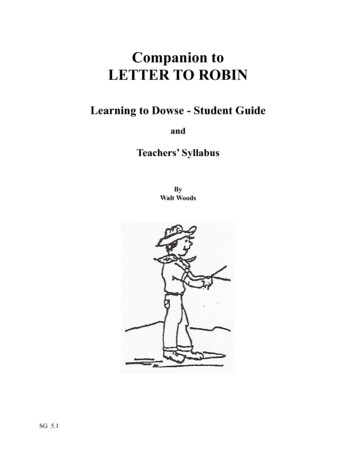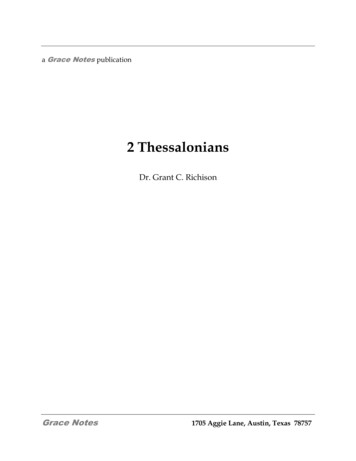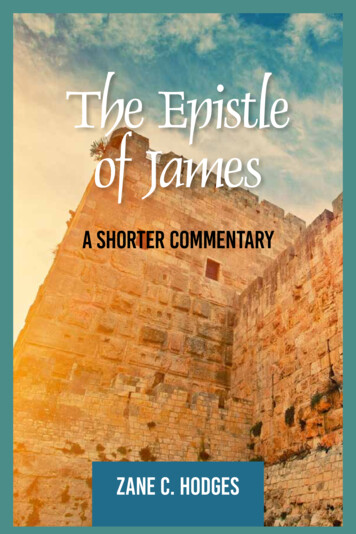
Transcription
The Epistleof JamesA shorter commentaryzane c. hodges
The Epistle of James: A Shorter Commentary is takenfrom The Grace New Testament CommentaryCopyright 2010, 2019 Grace Evangelical SocietyAll rights reserved. No part of this book may bereproduced in any form without the prior permission ofthe publisher, except as provided by USA copyright law.Unless otherwise indicated, Scripture quotationsare from The New King James Version, Copyright 1979, 1980, 1982, by Thomas Nelson, Inc.Design: Shawn LazarHodges, Zane C., 1932–2008ISBN 978-1-943399-33-8Requests for information should be addressed to:Grace Evangelical SocietyP.O. Box 1308Denton, TX 76202www.faithalone.orgges@faithalone.orgPrinted in the United States of America
The Epistle of James:a shorter commentaryINTRODUCTIONThe Epistle of James is a beautifully constructed Christian letterwritten by a skilled communicator with a pastor’s heart. His style isboth terse and graphic, employing a wide range of effective illustrations, making it easy to believe that he also taught God’s truth orallywith considerable power.An indispensable element of the NT canon, the letter’s profoundsubstance renders invalid Luther’s initial evaluation of the work asa “right strawy epistle.” The Book of James is the voice of a greatChristian leader whose grasp of the spiritual life and of humannature is equal to any in the NT. The modern Church ignores James’simmensely practical admonitions at its own peril.AuthorshipThe author calls himself James, a bondservant of God and of theLord Jesus Christ (1:1). But which James is this?The “James” most frequently connected with this letter is thehalf-brother of Jesus. If the epistle was written after the death of theApostle James (see the discussion on the date), then James the Lord’sbrother was the only well-known James left in the Christian churchof Palestine. He might then have easily referred to himself simplyand modestly as “a bondservant of God and of the Lord Jesus Christ”(1:1). It is also likely that the bearer of the epistle knew its author andwould so inform the recipients wherever it was read. In addition, the3
4The Epistle of Jamestone of authority in the epistle presupposes a fairly commanding andrespected figure, rather than an unknown James.Thus there are no compelling grounds for setting aside the traditional view of authorship by James the Lord’s brother. On the contrary, the epistle dovetails in important details with this identification of its writer.Audience, Date, and DestinationJames designates his intended audience as the twelve tribes (1:1).This naturally identifies the recipients as Jewish, and the tone. Thecontents of the epistle agree with this. The notion that the Epistleof James is a non-Christian Jewish document, into which someChristian additions have been inserted, is now properly regarded asfiction. Nevertheless, James makes no reference to the Gentiles, nordoes he show any awareness of the kind of evangelism typical of thePauline mission. This suggests the possibility that James was writtenbefore the Gentile outreach recorded in Acts.If the traditional date of James’s death (AD 62) is correct, the epistlecannot have been written later than that. Instead, the absence of anyconcern with the issues raised by the conversion of Gentiles suggeststhe possibility that the letter might be dated as early as the middleor late 30s. Taking April 3, AD 33 as the date of the crucifixion, theconversion of Saul of Tarsus (Paul) could have taken place in AD 34,leaving about a year or a little more for the events of Acts 1–9. In thatcase James could plausibly be dated as early as AD 34.If James is regarded as quite early, before the spread of the Gospelto the Gentile world, one can understand the phrase the twelve tribeswhich are scattered abroad accordingly. The words scattered abroadtranslate the Greek words en te„ diaspora (“in the dispersion”).From their unified, communal situation in Jerusalem (cf. Acts4:32-35), the early Christians were “dispersed” throughout Judea andSamaria. In fact in Acts 8:1 the English words they were scatteredtranslate diespare„san, which is from the same Greek root as diaspora.If James was written to this dispersed audience not long after theyhad undergone this very troubling experience, the writer’s pastoralstress on the spiritual value of trials is highly appropriate.Possibly the letter was written even before the evangelization ofSamaria. But since the Samaritans had a racial relationship to theJews, the early Christians could have viewed the Samaritan converts as returning to the spiritual community of the twelve tribes
A Shorter Commentary5who constituted the true Israel of that day (cf. Rom 2:28-29). A closestudy of the early chapters of Acts shows that the Christians did notyet regard the Church as an entity distinct from Israel in purposeand character. That enlightenment was to come later through Pauland through the other holy apostles and prophets of the early Church(Eph 3:5).In conclusion, therefore, the Epistle of James was a pastoral letterwritten to the dispersed Jewish believers of Palestine, probably ata time before Paul’s initial mission to the Gentile world, that is, toArabia (Gal 1:17). This would suggest a date of AD 34 or 35. On thisview James is by far the earliest NT document. (Galatians, the nextbook written, can be dated about AD 49).PurposeJames is writing to Christians who had been scattered (1:1) by thepersecution that arose after Stephen’s death. This persecution hadprobably now subsided (see Acts 9:31). No doubt the memory of theirrecent trouble was still fresh in the readers’ minds. But enough timehad passed for new difficulties to appear, and the stress these causedwas manifested in various kinds of intra-church problems, such asquarrels and disputes (4:1). James’s letter is an effort to encouragethese believers to face trials with faith and perseverance (5:7-8, 10),and to renew a spirit of peace within the churches (5:9).The structure of James’s letter helps us define his purpose evenmore closely. The threefold admonition of 1:19, “let every man beswift to hear, slow to speak, slow to wrath,” in fact, is the key to theletter’s development. James adopts for his letter a structure knownand approved for speeches by ancient writers of rhetoric. Of course,as contemporary rhetorical criticism has pointed out, the NT documents were almost certainly intended for public reading in thechurches. Thus James’s letter is basically a speech or sermon, cast inwritten form. Its basic elements are as follows: a preface, or prologue(1:2-18), followed by a thematic statement (1:19-20); a body, called bythe Greek rhetoricians the kephalaia, or “headings” (1:21–5:6); andan epilogue (5:7-20). The outline below shows this structure.
The Epistle of James6With this ground plan in mind, the thematic material in 1:19-20reveals the purpose of James as set forth in the following outline.OUTLINEI. Salutation (1:1)II. Prologue: Respond to Trials Properly (1:2-18)A. Welcome Trials (1:2-11)B. Do Not Accuse God (1:12-18)III. Theme: Behave Well in Trials (1:19-20)IV. Body: Cultivate the Necessary Behavior (1:21–5:6)A. Be Swift to Hear (1:21–2:26)B. Be Slow to Speak (3:1-18)C. Be Slow to Wrath (4:1–5:6)V. Epilogue: Persevere in Trials to the End (5:7-20)A. Perseverance Will Be Properly Rewarded (5:7-11)B. Perseverance Can Be Undergirded by Prayer (5:12-20)COMMENTARYI. Salutation (1:1)1:1. The author of the epistle was evidently James, one of Jesus’half-brothers (see Introduction). He was also a prominent leader inthe Jerusalem church. Yet he does not lay claim to any prestigioustitle, but simply calls himself a servant of God and of the Lord JesusChrist. This humility might well be expected of a man who grew upin the same household with the sinless Son of God.James addresses an audience whom he calls the twelve tribes whichare scattered abroad. If this epistle was written to Jewish Christiansnot long after the first persecution of the church in Jerusalem (c.
A Shorter Commentary7AD 35; see Introduction), the addressees are the true believing Israelwithin the larger Jewish nation (cf. Rom 2:28-29; 9:6-8).II. Prologue: Respond to Trials Properly (1:2-18)A. Welcome Trials (1:2-11)1:2-4. James refers to his readers as his brethren, not becausethey are fellow Jews, but because they have been born from above,brought forth by the word of truth (1:18; cf. Acts 9:30; 10:23, etc.).This form of address, (my) brethren, is frequent in this epistle (1:16,19; 2:1, 5, 14; 3:1, 10, 12; 4:11; 5:7, 9, 10, 12, 19). Even a superficial reading of 1:2-18 shows that the author regards his readers as Christians.It may be said that nowhere in the letter—not even in 2:14-26—doeshe betray the slightest doubt that those in his audience are truly hisbrothers or sisters in the Lord. If this simple and obvious fact is notobserved, one may fall into a quagmire of skewed interpretations,just as many expositors of James have actually done.The words count it all joy are actually the opening words of v 2 (inGreek). They strike precisely the note of triumph that James wishesto sound for his Christian brothers. They should be joyful in trialsbecause trials have a positive and highly beneficial purpose in theplan of God. And that purpose is stated here as something known tothe readers. God’s intention in allowing faith to be tested is to produce patience, more accurately, “endurance” or “perseverance.” Godis in the business of building up strong Christian men and womenwho can persevere in hard times without fainting.But believers must not be impatient. This is the thrust of v 4. WhenJames urges his readers to allow “endurance” (patience) to have itsperfect work, he means that they should allow the Lord to accomplish a complete work of endurance within them. Of course, by perfect James does not mean sinless perfection. Both Greek words, perfect and complete, mean much the same thing, but they might berendered this way: “that you may be complete and intact, with nodeficiency.”1:5. One of the deficiencies that trouble often exposes is lack ofwisdom. Thus, if “endurance” is to accomplish its “complete work”,the deficiency in believers’ wisdom needs to be supplied. Of course,James is not speaking here of any and all wisdom, since believers willalways be deficient in many such areas while still in the body. Rather,in this context, James is speaking of that particular wisdom neededto cope with the various trials they experience.
8The Epistle of JamesSo if a particular trial exposes a particular lack of wisdom in somearea, what should a believer do? James’s answer is that he shouldpray for this wisdom. God loves to bestow wisdom and He bestowsit bountifully. Ask, James reiterates, and it will be given (cf. Matt 7:7;Luke 11:9).1:6. There is one stipulation, however. The request for wisdommust be made in faith (v 6). This also means the request must bemade with no doubting. Faith and doubting are opposites, of course.When one doubts, he is not believing. When one believes, he is notdoubting. (See Matt 14:31; 21:21; 28:17; Mark 11:23; Rom 14:23). TheChristian who comes to God for wisdom must come with calm confidence in the Lord. If his heart is buffeted by doubts about God’swillingness or ability to grant the request, then this Christian is likea wave of the sea driven and tossed by the wind. That is, he is in thegrip of uncertainty and perplexity.1:7. His failure to trust the One to whom he comes in prayer isserious. Indeed, it is an insult to God Himself. Such a man shouldnot expect to receive anything from the Lord. Just as the Christianlife begins with the confidence that eternal life is by faith in Christ,so the believer’s ongoing need for wisdom must be sought from Godwith a similar confidence.On the other hand, it must not be assumed that the answer to aprayer for wisdom will come like a bolt of lightning the moment itis requested. Such a conclusion would ignore the context of James’sthought here. James has just said that God’s goal in trials is to furnishthose spiritual assets that are lacking (vv 3-4). Thus one can expectGod to answer his prayer for wisdom through the very trial itself, ashe endures it until God’s perfect work in him is done. An appropriateprayer may be, “Father, help me to gain from this trial the wisdomYou want me to have.”1:8. The Christian who cannot make up his mind to leave his needfor wisdom confidently in God’s hands is spiritually unstable. He is,in fact, double-minded (dipsychos, “two-souled”), a kind of “splitpersonality.” One part of him knows that he must leave this need fordiscernment with God, while the other part still feels that he can,and must, solve the puzzle by himself. The result of such an inwarddivision in perspective is likely to be a zigzag course of action filledwith mistakes and false starts. The Christian who combines a lack ofwisdom with the spirit of a “doubting Thomas” is a prime candidate
A Shorter Commentary9to make a mess of things. Or, as James puts it, he is unstable in allhis ways.1:9. How then should the lowly brother accept trials? (By a lowlybrother James probably means a “poor brother,” since he is contrasted with the rich [brother] in v 10.) Does not a Christian of lowestate in life have enough problems just by virtue of his status? Howcan such a brother calmly, indeed joyfully, accept the additional trialswhich often befall him, especially those arising from the very fact ofhis being a Christian? James’s solution is simple. That brother shouldconsider his trials a form of exaltation.Two reasons for doing this are suggested in the immediate context.First, God is paying attention to the lowly brother by using trials tomake him a better person (vv 3-4). There is no higher honor thanto be the object of God’s gracious and loving concern. Also God ispreparing to bestow on this brother the crown of life, which comes tothose who endure testing (v 12 and discussion). That
Hodges, Zane C., 1932–2008 ISBN 978-1-943399-33-8 Requests for information should be addressed to: Grace Evangelical Society P.O. Box 1308 Denton, TX 76202 www.faithalone.org ges@faithalone.org Printed in the United States of America. 3 The Epistle of James: a shorter commentary INTRODUCTION The Epistle of James is a beautifully constructed Christian letter written
